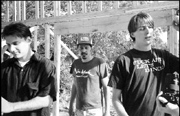THE SOUND OF male angst—the sort that Alicia Silverstone’s Clueless character dismissively labeled “complaint rock”—ruled the school in spring 1992.
The so-called grunge crowd—most of them hailing from Seattle’s rain-sodden environs—represented the vanguard of this unease. Nirvana, Pearl Jam, Soundgarden, Alice in Chains, and Smashing Pumpkins all made records that fuzzed and foamed with the toil of their inwardly directed battles, each engaged in a fight-to-the-death struggle with an array of inner demons. Eddie Vedder waged war on his past; Kurt Cobain and Layne Staley anesthetized themselves and wailed of the causes and/or consequences; Billy Corgan vainly fought a retreating hairline and a reflex to make Classic RockTM. It was an insular time, and a tribe of young males alienated from their culture (and, more fundamentally, from themselves) snapped it up by the truckload.
Pavement, meanwhile, began their existence in 1989 as a shadowy underground studio act pairing Stockton, Calif., childhood friends Stephen “S.M.” Malkmus and Scott “Spiral Stairs” Kannberg. Malkmus was a recent University of Virginia history graduate living in Jersey City; Kannberg was a Sacramento college student committed to neither the locale nor a degree. The pair’s early recorded work (an elliptical series of limited-release EPs on Chicago’s nascent Drag City label) buried jagged lo-fi feedback blasts and studiously Anglophilic melodies under layers of messy static and hiss, an attempt to create an insulated foxhole of hipster cred from where they could wage their own outwardly directed war of attrition on the mainstream music industry.
The differences couldn’t have been starker. Grunge made a virtue of emotions rubbed raw enough to bleed, hearts worn on sleeves, and an agnostic blend of mid-’70s AOR sonics (Aerosmith, Led Zeppelin, Black Sabbath) and late-’70s hardcore attitude (Black Flag, the Germs). Pavement and Malkmus’ self-described “preppy scumrock” peers chose to worship slack posturing, obscurist avant-rock buried deep within their record collections (the Fall, Swell Maps, various strains of Krautrock), a smart-assed brand of pseudo-intellectualism, and the dispassionate remove of rock-crit cynicism.
Grunge never met a neurotic impulse it couldn’t leverage as song fodder; Pavement’s suburban indie kids had never experienced emotions strong enough to register as such.
It was into this bifurcated setting that Slanted and Enchanted was dropped after a seven-month tussle to determine which label would eventually win the privilege of issuing it. Matador, the eventual victor of the anti-shoot-out, has just released a 10th- anniversary edition of the album (dubbed Luxe and Reduxe). The expanded two-disc set is filled with a dazzling array of outtakes, Peel Session material, and live bonus babies. A decade following its initial appearance, the record’s shadow continues to loom large over the Amer-indie landscape, and strangely enough, Pavement still sound a lot like the future of rock.
UPON ITS ARRIVAL, Slanted and Enchanted was immediately recognized as one of the most significant records of the ’90s, kick-starting, as it did, an entire musical subgenre and changing the way the underground and mainstream regarded one another. Lengthy, obsessive pieces about the record and its impact ran in publications from The New York Times to Spin (whose review of the advance cassette ran months before its release—an indicator of the anticipation), signaling the cultural elevation of the slacker from underground landscape feature to a fixture at your local 7-Eleven.
From a musical vantage point, everything that had been hinted at on the band’s previous EPs crystallized on Slanted and Enchanted: the encoded anti-rock star messaging (“Pass out the gold, the diamond watch, the last reward, all the things we had before you sold us out,” lectured Malkmus on “Fame Throwa,” his cautionary tale of bowing to The Man); the amateurish lo-fi aesthetic now hard-wired into a semi-coherent template (the record’s first single, “Summer Babe,” demonstrates that Pavement knew a good melody when they heard one—but had trouble untangling it from a morass of primitive noise and their tendency to subvert conventional pop structures with ear-prickling scree and prog-aspiring drum fills); the laconic, tossed-off vocals hovering somewhere between Lou Reed’s sing/speak and your old college dorm buddy’s stoned karaoke routine. Slanted and Enchanted boldly disregarded convention, folded genres in on one another like melted chocolate bars, and created a string ball of complexity with fractured riffs, skewed melody lines, and enough attitude to wow the prep-school kids and the street scuzz simultaneously. It was a bold, cocky effort, full of cryptic observations (“Lies and betrayals, fruit- covered nails, electricity and lust”) and, mostly, itself (the ridiculously self-referential “Our Singer”). But it was brilliant all the same.
As it turns out, in between their early EPs and Slanted, Pavement somehow evolved into a Real Band by adding drummer Gary Young—whose Louder Than You Think Studios in the garage of his down-at-the-heels Stockton home was the band’s early recording venue of choice. Young was a fry baby, an ex-hippie who had burned enough brain cells to render him loopy and was given to unpredictable antics during the band’s infrequent live shows (handstands on stage, handing out salads at the door as audiences filed in, collapsing in a drunken heap midway through gigs, etc.). Young’s drumming was only loosely tethered to the beat, and S.M. and Stairs moved quickly to shore up this perceived flaw by bringing in Malkmus’ college friend Bob Nastanovich as a second drummer (Nastanovich would eventually go on to become the Bez of Pavement after Young departed in 1993, replaced by the altogether more “together” Steve West). Mark Ibold was lured away from New York’s Dustdevils, and suddenly the two-person, tape-splicing party had evolved into a bona fide band—sort of.
True to Pavement’s deeply embedded perversity, Slanted and Enchanted included contributions from each of the band’s five members but never captured them playing together as a unit; as is amply documented in the new liner notes, the record was instead pieced together from various fragments by Malkmus and Kannberg in early 1992. To continue down the path of nontraditional milestones, Pavement’s members also saw fit to distribute themselves all about the country and didn’t live near enough to one another to afford much in the way of Real Band activity, such as rehearsals (S.M. remained in Jersey City; Ibold lived in New York; Young in Stockton, Spiral Stairs in Sacramento, and Nastanovich in Kentucky—across the street from Churchill Downs, the better to indulge his passion for horse racing). While the band’s arch slop-rock was most certainly a reaction to the “refined” sounds it had been forcibly fed for the better part of the previous decade, it was also the logical through-put of a group who only occasionally gathered together to record and tour.
Matador’s rerelease offers treasure for both the veteran and the apprentice. Pavement’s fine Watery, Domestic EP is added to the package (including the oft-quoted boast from “Frontwards”: “I’ve got style, miles and miles, so much style that it’s wasted”), as are various B-side gems such as “Greenlander” and “Baptist Blacktick.” In addition, the set tacks on a London show where the band plays as though on bad speed and Malkmus cracks wise from the stage with random banter ranging from Echo and the Bunnymen in-jokes to the relative volume of Ibold’s amp. It’s less sloppy than you might think, more crafty than it appeared at the time, and never less than compelling.
TEN YEARS LATER, we’re left to assess the impact/damage done by the grunge and slack camps. Grunge, as such, has much to answer for. FM “action rock” stations are clogged like bad arteries with lesser copies of the style such as Creed, Matchbox Twenty, and others too grim to mention, and most of the original issue are either gone or, like Pearl Jam, have moved so far beyond their initial charter as to be virtually unrecognizable to those who declared their love in the first place.
Insofar as Pavement are concerned, it’s safe to say that while many aspired to their style (Trumans Water, Strapping Fieldhands, Grifters, Archers of Loaf, Weezer, et al.), none could quite match their makeshift irony and wiseacre M.O. And when the group’s inexorable march toward what it called “Gold Soundz” culminated in their near-miss with the mainstream, 1994’s “Cut Your Hair,” Pavement and their cult beat a hasty retreat back to the trenches of the underground, where their ongoing battle of taste and temperament with the bastards of the music industry could be fought under the proper conditions of concealment and decay.
An unbelievable amount of change was shoehorned into the decade since Slanted and Enchanted was first released; while much of it has been for the better, some clearly led us down a dark, unimproved road. This record stands as a monument to different days.









